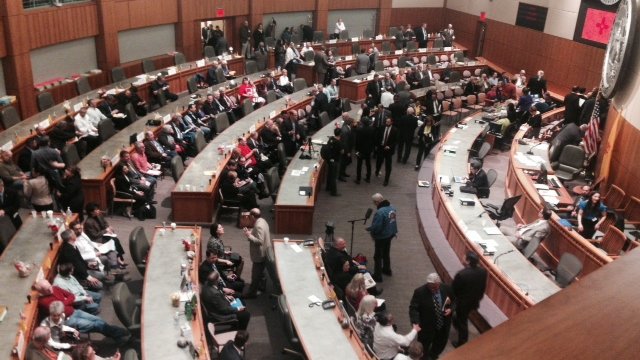Seeing an editorial on Friday morning quoting flawed math about right-to-work legislation and its correlation between employment growth and a right-to-work law was too much for University of New Mexico professor Tamara Kay.
A statistician and social scientist, Kay said the numbers former Senator Pete Domenici quoted in the state's largest daily Friday morning may be correct, but they're misleading and far from statistically accurate. Domenici quoted a 2012 Rio Grande Foundation study that said New Mexico would see significant growth if right-to-work was passed.
"I got involved because I was reading and a lot of the numbers are inaccurate," Kay said Friday while waiting to testify before the House Judiciary Committee in Santa Fe. "The numbers are averages. That's kindergarten math. No one can walk into the Anderson School of Business and say, 'Look at these averages,' and get a job. That makes no sense statistically. I was concerned that public policy was being made for bad math."
"As I'm going to say today [to the committee], explaining averages is like saying there are higher birth rates where there are more storks, but that doesn't mean storks bring babies," she said.
Right-to-work has been a hot topic during this year's legislative session. The measure, now called the Employee Preference Act, has received a lot of attention and so many people wanted to testify at a hearing on the measure on Wednesday that the committee had to move to the floor of the House just to accommodate every one.
Kay's work mirrors a recent study by Gordon Lafer and Alyssa Davis of the Economic Policy Institute, which quotes the research of Dr. Heidi Shierholz, now chief economist of the U.S. Department of Labor. The report, "Right-to-Work is the Wrong Answer for New Mexico's Economy," also hammers the math used by several proponents, specifically calling out the Rio Grande Foundation's work that Domenici quoted on Friday.
"A number of methodological problems make this report unreliable," the two wrote. "The calculations that the report is based on are fundamentally flawed, and the report therefore cannot serve as a useful guide for lawmakers."
The EPI report slams the Rio Grande Foundation's report — the same one quoted by Domenici — for not having enough variables in the report and says other reports that take into consideration more variables show that right-to-work doesn't improve a state's economy, wages or growth.
"If you don't know anything about statistics, I can see how you buy it," she said. "My day job is to explain the numbers. If you want to make the ideological argument, that's fine, but don't use bad math."
In this case, she explained, the report Domenici quoted, called "Right-To-Work and Economic Growth" not only uses too few data points, "but its numbers are from the 1940s." Some of the data was taken from the late 1940s, after the Taft-Hartley Act was passed, she said.
Kay said comprehensive studies such as Shierholz's show that states that have passed right-to-work legislation show slower job growth, lower wages and greater income equality.
"These organizations have money. Why aren't they hiring economists and have them do good work? The dangers are very serious for the most vulnerable people with the state," Kay said. "That's why I felt I had to say something."
Want Albuquerque news in your inbox? Click here to sign up for our email newsletters.
